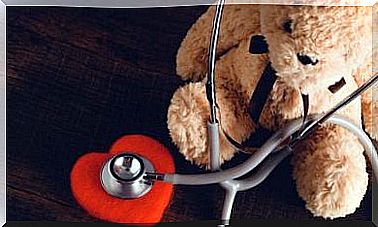Borderline Disorder And The Relationship With Dogs

People with borderline personality disorder feel a great inner emptiness. Often times, it is the result of dysfunctional childhood experiences. When asked about their history, we see that a large number of people repeat the same pattern: parents not available, lack of affection or attention, invalidation of emotional needs, etc.
It is not only the disabling environment that is responsible for the genesis of borderline personality disorder. Genetics play an important role that must be taken into account. Either way, the patient feels broken inside, lost, drowned in despair.
The fear of possible abandonment is so great that in order to confirm their own beliefs, patients tend to self-destruct. Therefore, they alienate themselves from the people who love them.
It should be noted that patients with BPD have extreme sensitivity. They experience deep emotional pain when contradicted or frustrated in some way.
Dogs or pets they become attached to are not judgmental and will not abandon them. So they can easily bond with it as a way to get love without having to go through the emotional wounds, as usually happens in interpersonal relationships.

Borderline Disorder and the Relationship with Dogs: The Benefits of This Link
Here is a non-exhaustive list of the benefits of the relationship between a borderline patient and a dog:
- Emotional validation: Unlike what can happen in interpersonal relationships, animals cannot emotionally invalidate the BPD patient. Emotional invalidation involves depriving the patient of their own emotions. Normally, the family environment of the person with BPD has tended to invalidate it. This by telling the patient phrases such as: “ You shouldn’t be thirsty, you just had a drink ” or “ I don’t understand why you cry all the time when you have everything” . A dog, on the other hand, cannot do this, which means the person feels accepted and fully validated.
- Lack of judgment: a pet cannot judge its owner. First, because he has no language to express it. Then because he does not have the cultural and social beliefs that humans have. These beliefs, stereotypes or prejudices are sometimes responsible for the judgments we make of others. Patients with BPD suffer excruciating emotional pain when judged on their behavior. This leads to the failure of their relationship. Therefore, the chosen dog or pet can bring them great calm by not having to face any judgment on their person.
- Support: The dog can provide great company for the patient with BPD. Even if the person is feeling unhappy, crying, or is in a moment of instability, the dog will stay by their side. Like we said before, he won’t judge her
- The accompaniment provided by the dog translates into affection and warmth: sometimes, these patients need it precisely to rebalance themselves. In this sense, dogs can do a great job in terms of emotional regulation of patients.
- Unconditional love: Dogs bring love without asking for anything in return. Since BPD patients have very low self-esteem, dogs can compensate for this lack by helping them feel better. Many of the behaviors of BPD patients are carried out precisely in search of affection, tenderness and understanding. In many cases, they have the opposite effect and people end up rejecting them and walking away. Faced with this dynamic, the dog will always give unconditional love to his master, even if he is not in his best condition.

Disadvantages of dogs for the BPD patient
Dogs are particularly attached to BPD patients. However, it is also true that there are not only advantages to this relationship. The dog can become a tampon of emotions, acting as a kind of emotional plaster.
Their mission is to cover up the dysfunctional and painful emotions of the patient. This is very good at first, because it helps the BPD patient to regulate himself. But also to feel more emotionally stable. It is obviously a priority objective of any psychological treatment of this pathology.
The problem is, this dog-patient relationship can make the patient dependent. He can deviate from any situation of an interpersonal nature. Therefore, there is a risk that the person is locked in the relationship with his animal.
It will therefore be necessary to “use” the relation in a prudent way. The idea is to maximize the benefits that the animal can bring, but without the emotions that depend on it. People with BPD must also set goals for relationships with those around them. She must be prepared to be frustrated at times or to receive criticism. She must then learn to manage and cope with them.
Another disadvantage of these attachment relationships with the pet is the fact that he dies much earlier than the patient. It can lead to a big crisis with all that it entails – ideas of autolysis, impulses, aggression, intense dysphoria, etc.
Therefore, as in everything, there will be a point of equilibrium in which virtue resides. BPD patients can benefit from a relationship with an animal. But care must also be taken not to generate a toxic attachment which becomes a substitute for effective emotional regulation.










